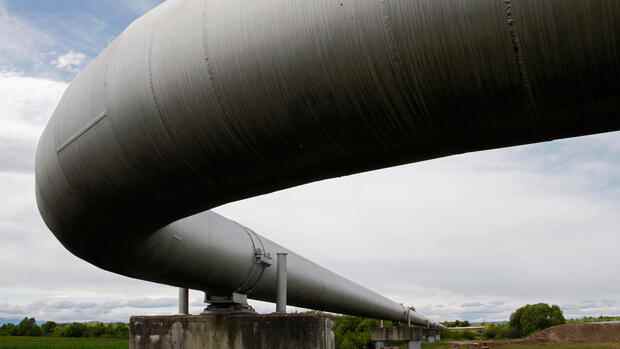In Belarus, the pipeline splits into a southern and a northern arm.
(Photo: mauritius images / Art Directors & TRIP / Alamy / Alamy Stock Photos)
Brussels, Berlin Since the morning of August 4th, no more oil has come through the southern branch of the “Druzhba” pipeline. This leads from Russia via Belarus and the Ukraine to Hungary, Slovakia and the Czech Republic. The interruption became known on Tuesday – it has consequences for all of Europe.
The Hungarian oil company Mol wants to get operations up and running again as soon as possible and says it has paid money to the Ukrainian pipeline operators for this purpose.
Because the Russian company Transneft gives problems with payments as the reason for the interruption in delivery. Transneft usually pays Ukraine’s Ukrtransnafta upfront oil transit fees, which totaled $15 million in July. The payment for August was rejected by the responsible European bank due to EU sanctions, Transneft claims. As a result, Ukraine stopped the transmission.
The EU sanctions prohibit a number of banking transactions. However, payments for oil and gas are explicitly excluded. “The Ukrainian side has promised to resume within a few days the transport of crude oil, which was stopped a few days ago due to technical problems on the banking front,” Mol said, according to the Financial Times. The oil price rose by around a dollar a barrel as a result of the disruption, but then weakened slightly again.
Top jobs of the day
Find the best jobs now and
be notified by email.
How essential the line is for Slovakia, the Czech Republic and Hungary became apparent in May when the three countries prevented an agreement on an EU-wide oil embargo for weeks and finally managed to allow pipeline deliveries to continue.
Pipeline arm for Germany still in operation
Western diplomats also expressed understanding at the time: it was particularly difficult for these landlocked countries to get oil into the country via other routes. According to the International Energy Agency, the Czech Republic gets 21 percent of its oil from Russia, Hungary 43 percent and Slovakia 75 percent.
Dependent
75
percent
According to the International Energy Agency, Slovakia gets its oil from Russia, 43 percent from Hungary and 21 percent from the Czech Republic.
The northern strand of the Druschba pipeline, which supplies the PCK Schwedt refinery in Brandenburg, is not affected by the interruption. Nevertheless, Germany has been working for months to make itself independent of the supply of Russian oil via the Druzhba pipeline.
It is a problem that cannot be “quickly and easily solved”, said a spokeswoman for Federal Economics Minister Robert Habeck (Greens). “But we are aware of the importance of the situation in relation to the Schwedt refinery, the supply and the jobs. That means the location stays the same,” she added.
The refinery in Schwedt plays a key role in supplying the Berlin/Brandenburg area with petrol, diesel, kerosene and heating oil. It represents around 90 percent of consumption.
In order to be able to operate the refinery in the future without Russian oil from the Druzhba pipeline, delivery via the Baltic Sea ports of Rostock and Gdansk in Poland can be considered. The spokeswoman Habecks said that the first deliveries had already been made via the pipeline from the port of Rostock to Schwedt. The pipeline is being overhauled to allow for higher utilization. “An additional delivery via the port of Gdansk and via the Polish part of the Druzhba is also possible.”
>> Read here: What’s next for Schwedt? When uncertainty makes citizens angry
The federal government and the oil industry are in talks with Poland about this. “It is possible, but there will be no delivery from the Polish side to a Russian company.” The refinery in Schwedt is majority owned by Rosneft Germany, a subsidiary of the Russian Rosneft group.
The EU Commission has not yet commented on the process. MEP Viola von Cramon (Greens) sees it as another point in a “long list of lies and attempts at blackmail by the Kremlin”. She said that Russia was concerned with “putting further pressure on the EU and undermining unity in supporting the sanctions, especially in the member states Hungary, Slovakia and the Czech Republic that are now particularly affected”.
More: Rescue from Venezuela? New hope for the oil refinery in Schwedt
